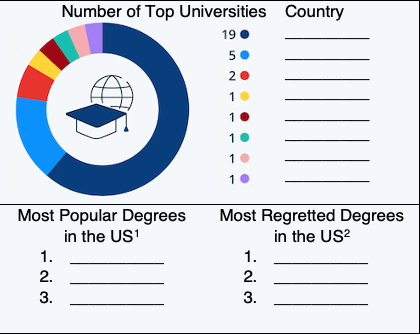Lesson Topics: college/university, educational reform
Skill Focus: Speaking, Reading, Vocabulary
Approximate Class Time: 1.5 hours
Lesson Plan Download: university-degree-upper-intermediate-122023.docx
Lesson Overview:
- After warm-up questions, students guess which countries have the most highly-ranked universities worldwide, which degrees are the most popular in the US, and which degrees are the most regretted.
- The reading passage is fairly short, at 206 words. It summarizes the reasons why interest in college in the U.S. appears to be on the decline. (The passage also contains some statistics about the UK to make it a little more inclusive). The article focuses on the high costs and the appearance of other educational options.
- After a memory recall activity, students complete comprehension questions. This is followed by a vocabulary-matching exercise and an activity where students make questions using the target vocabulary.
- The first speaking activity is a debate either on the value of obtaining a degree or whether education should be free. Next, students imagine they are on a high education reform committee and suggest changes to the university system.
- The lesson includes two fun roleplays; the first is between a college applicant and an admissions officer, and the second is between an indebted student and a banker.
- The lesson ends with a few famous quotations related to higher education, a final vocabulary review, final discussion questions, and a review of collocations.
Note: Perhaps confusingly, the terms 'college' and 'university' are used somewhat interchangeably in this lesson, despite having different meanings in different parts of the world.

INTERMEDIATE (B1/B2) EFL Lesson Plan on Getting a Degree
Warm-up Questions
- Have you gone to university or college? If so, how was it? If not, do you plan to?
- To be successful, is going to university necessary?
- Predicting: You are going to read some reasons for why people don't want to go to university. What ideas do you think will be presented?
- This chart is from Statista’s ‘World University Ranking 2024’. It shows the number of top universities in each country. Which countries do you think are on the list? (Answers atop next page)
- Is your country’s education system among the best?
- Place the below degrees into one of the tables on the right. Discuss your choices.Nursing Business
Journalism Liberal Arts/General Studies
Psychology Sociology
(Answers at bottom of next page)

Membership is required to view this post. Please support EnglishCurrent by becoming a member today. Members, please log in.
-- Lesson plan on the value of university written by Matthew Barton of EnglishCurrent.com (copyright). ChatGPT was used to suggest expressions for speaking activities and generate answer keys. Site members may photocopy and edit the file for their classes. Permission is not given to rebrand the lesson, redistribute it on another platform, or sell it as part of commercial course curriculum. For questions, contact the author.
Possible answers to follow-up questions:
- …
- ….
- The numbers suggest that interest and confidence in college is declining among Americans.
- Many students in North America afford their tuition by taking out student loans, which can take an average of twenty years to repay.
- According to the passage, 38% of students in the U.S. who start college do not complete their degree. This might be significant because it suggests that a large number of students are incurring debt without obtaining the degree that could potentially increase their earning power.
- People now study online. This studying might mean taking a course on YouTube, using an online college, or getting training online for a job.
Vocabulary Answers: 1-b, 2-h, 3-e, 4-a, 5-g, 6-f, 7-d, 8-c
Vocabulary Review Answers: See original passage
Collocation Answers: 1-a, 2-d, 3-c, 4-b
Footnotes:
- [1] https://www.forbes.com/sites/michaeltnietzel/2022/02/16/what-are-the-most-popular-majors-for-prospective-college-students/?sh=3e57089c15d2
- [2] https://www.cnbc.com/2022/11/12/the-top-10-most-regretted-college-majors.html
- [3] https://news.gallup.com/poll/508352/americans-confidence-higher-education-down-sharply.aspx
- [4] https://study-uk.britishcouncil.org/moving-uk/cost-studying
- [5] https://educationdata.org/average-cost-of-college#:~:text=The%20average%20cost%20of%20attendance,or%20%24223%2C360%20over%204%20years
- [6] https://educationdata.org/average-time-to-repay-student-loans
- [7] https://time.com/6265266/america-college-degrees-essay/
- [8] https://usprogram.gatesfoundation.org/news-and-insights/articles/gates-foundation-probes-college-enrollment-decline
